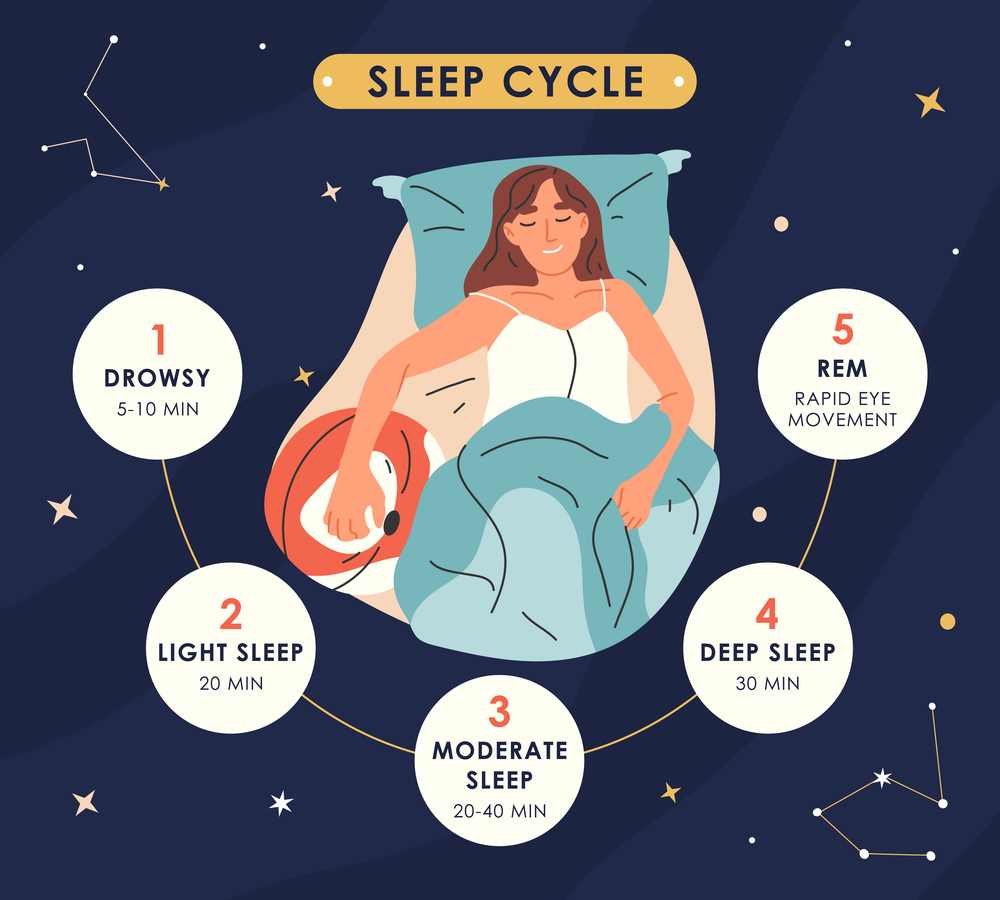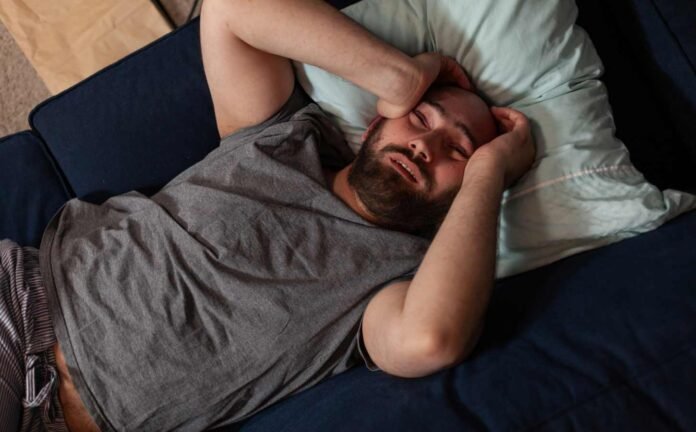The sleep-wake cycle is a fundamental biological process that regulates our daily sleep and wakefulness patterns.
The sleep-wake cycle is an internal clock that helps us maintain a consistent sleep schedule and ensures that we get the right amount of sleep each night. The sleep-wake cycle is controlled by a complex system of hormones and neurotransmitters that work together to regulate our sleep patterns.
The sleep-wake cycle is important for many aspects of our health and well-being. It affects our mood, energy levels, cognitive performance, and overall health. Disruptions to the sleep-wake cycle can lead to a range of health problems, including insomnia, sleep apnea, and other sleep disorders. Understanding the sleep-wake cycle is essential for maintaining good sleep hygiene and promoting healthy sleep habits.

Understanding the Sleep-Wake Cycle
The sleep-wake cycle is a complex process that regulates the timing and quality of sleep. It is controlled by both internal and external factors, including circadian rhythms, homeostasis, the suprachiasmatic nucleus (SCN), melatonin, and hormone regulation.
Circadian Rhythms and Homeostasis
Circadian rhythms are biological processes that follow a 24-hour cycle. They are controlled by the body’s master clock, located in the SCN of the brain. The master clock regulates the timing of various physiological processes, including the sleep-wake cycle, body temperature, and hormone production.
Homeostasis is another factor that influences the sleep-wake cycle. It is the body’s ability to maintain a stable internal environment. When we are awake, our body produces adenosine, a chemical that builds up in the brain and creates a feeling of sleepiness. As we sleep, adenosine is broken down, allowing us to wake up feeling rested.
Role of the Suprachiasmatic Nucleus (SCN)
The suprachiasmatic nucleus is a small group of cells located in the hypothalamus of the brain. It is the body’s master clock, controlling the timing of various physiological processes, including the sleep-wake cycle. The SCN receives information about light and dark from the eyes, which helps to synchronize the body’s internal clock with the external environment.
Melatonin and Hormone Regulation
Melatonin is a hormone that is produced by the pineal gland in response to darkness. It helps to regulate the sleep-wake cycle by promoting sleepiness and reducing alertness. Other hormones, such as cortisol and growth hormone, also play a role in regulating the sleep-wake cycle.
In summary, the sleep-wake cycle is a complex process that is regulated by a variety of internal and external factors. Circadian rhythms, homeostasis, the suprachiasmatic nucleus, melatonin, and hormone regulation all play important roles in controlling the timing and quality of sleep.
Physiological Mechanisms of Sleep
Brain Activity During Sleep
The sleep-wake cycle is regulated by the complex interplay of various physiological mechanisms. One of the most important factors is brain activity. During sleep, the brain undergoes a series of changes that are characterized by changes in electrical activity. The different stages of sleep are characterized by specific patterns of brain waves.
The brain waves during sleep can be divided into two main categories: slow waves and rapid eye movement (REM) waves. Slow waves are associated with non-REM (NREM) sleep, which is further divided into three stages: N1, N2, and N3. REM waves, on the other hand, are associated with REM sleep.
Sleep Stages and Their Functions
The different stages of sleep serve different functions. N1 and N2 are considered light sleep stages, while N3 is considered deep sleep. During deep sleep, the body repairs and regenerates tissues, builds bone and muscle, and strengthens the immune system. REM sleep, on the other hand, is associated with dreaming and memory consolidation.
Hormones and Neurotransmitters
The regulation of the sleep-wake cycle is also influenced by hormones and neurotransmitters. The hormone melatonin, for example, is produced by the pineal gland and helps regulate the sleep-wake cycle. Levels of melatonin rise in the evening and fall in the morning, helping to promote sleep. Other hormones, such as cortisol and growth hormone, also play a role in regulating the sleep-wake cycle.
Neurotransmitters, such as serotonin and norepinephrine, are also involved in regulating the sleep-wake cycle. Serotonin is involved in promoting sleep, while norepinephrine is involved in promoting wakefulness. The balance of these neurotransmitters is important for maintaining a healthy sleep-wake cycle.
In summary, the physiological mechanisms of sleep are complex and involve a variety of factors, including brain activity, sleep stages, hormones, and neurotransmitters. Understanding these mechanisms is important for promoting healthy sleep habits and treating sleep disorders.
Factors Influencing the Sleep-Wake Cycle
The sleep-wake cycle is influenced by various factors including environmental and light exposure, age and development, and lifestyle and behavior. These factors can affect the body’s internal clock, also known as the circadian rhythm, which regulates sleep and wakefulness.
Environmental and Light Exposure
The environment and light exposure play a crucial role in regulating the sleep-wake cycle. Exposure to light, especially blue light, can suppress the production of melatonin, a hormone that regulates sleep. On the other hand, darkness promotes the production of melatonin, which helps in inducing sleep.
Temperature is another environmental factor that can affect sleep. A cool and comfortable room temperature is ideal for promoting sleep. Noise and other distractions can also disrupt sleep, making it difficult to fall asleep or stay asleep.
Influence of Age and Development
Age and development also play a significant role in regulating the sleep-wake cycle. Infants and young children require more sleep than adults, while older adults may experience changes in their sleep patterns. Adolescents may experience a shift in their circadian rhythm, resulting in difficulty falling asleep early and waking up early.
Effects of Lifestyle and Behavior
Lifestyle and behavior can also affect the sleep-wake cycle. Regular exercise can promote better sleep, while caffeine and alcohol can disrupt sleep. Stress and anxiety can also affect sleep, making it difficult to fall asleep or stay asleep.
Travelers and shift workers may also experience disruptions in their sleep-wake cycle due to changes in their schedules and exposure to light at different times of the day.
In conclusion, various factors can influence the sleep-wake cycle, including environmental and light exposure, age and development, and lifestyle and behavior. Understanding these factors can help individuals make lifestyle changes that promote better sleep and overall health.
Sleep Disorders and Disruptions
Insomnia and Its Impact
Insomnia is a common sleep disorder that affects millions of people worldwide. It is characterized by difficulty falling asleep, staying asleep, or waking up too early and not being able to fall back asleep. Insomnia can have a significant impact on a person’s quality of life, including their mood, productivity, and overall health.
There are several types of insomnia, including acute, chronic, and comorbid insomnia. Acute insomnia is typically short-term and often occurs due to stress or a change in sleep environment. Chronic insomnia, on the other hand, is a long-term condition that may require medical intervention. Comorbid insomnia is when insomnia occurs alongside another medical or psychiatric condition.
Sleep Apnea and Breathing
Sleep apnea is a sleep disorder that occurs when a person’s breathing is interrupted during sleep. It is often caused by a blockage in the airway, which can lead to loud snoring, gasping, or choking during sleep. Sleep apnea can have serious consequences if left untreated, including high blood pressure, heart disease, and stroke.
There are two main types of sleep apnea: obstructive sleep apnea (OSA) and central sleep apnea (CSA). OSA occurs when the airway is blocked, while CSA occurs when the brain fails to send the proper signals to the muscles that control breathing.
Circadian Rhythm Disorders
Circadian rhythm disorders are disruptions to the body’s natural sleep-wake cycle. These disruptions can occur due to a variety of factors, including jet lag, shift work, and certain medical conditions.
Jet lag is a temporary circadian rhythm disorder that occurs when a person travels across multiple time zones. Shift work disorder is a chronic condition that affects people who work non-traditional hours. Advanced sleep-wake phase disorder is a condition where a person’s sleep-wake cycle is shifted earlier than normal, while irregular sleep-wake rhythm disorder is when a person’s sleep is fragmented throughout the day and night. Restless legs syndrome is a condition where a person experiences an uncontrollable urge to move their legs, often leading to difficulty falling asleep.
Overall, sleep disorders and disruptions can have a significant impact on a person’s health and well-being. It is important to seek medical attention if you are experiencing any symptoms of a sleep disorder to ensure proper diagnosis and treatment.
Consequences of Altered Sleep Patterns
Impact on Health and Disease
Altered sleep patterns can have a significant impact on an individual’s health and increase the risk of various diseases. Studies have shown that individuals with irregular sleep patterns are at a higher risk of developing obesity, diabetes, cardiovascular diseases, renal diseases, and immune disorders. The body’s natural sleep-wake cycle plays a crucial role in regulating hormones that control appetite, metabolism, and insulin levels. Disrupting this cycle can lead to hormonal imbalances that can contribute to the development of these diseases.
Cognitive Functions and Performance
Sleep plays a vital role in cognitive functions such as memory, learning, and performance. Altered sleep patterns have been linked to a decline in cognitive functions, which can affect an individual’s ability to learn and perform tasks. Lack of sleep can also lead to increased stress levels, which can further impact cognitive functions. Studies have shown that individuals who get adequate sleep have better memory retention and cognitive abilities.
Emotional Well-Being and Mood
Sleep also plays a crucial role in emotional well-being and mood. Altered sleep patterns have been linked to an increased risk of depression, anxiety, and stress. Lack of sleep can lead to increased levels of cortisol, a stress hormone that can affect an individual’s emotional well-being. Adequate sleep, on the other hand, can help regulate emotions and improve mood.
In conclusion, altered sleep patterns can have significant consequences on an individual’s health, cognitive functions, and emotional well-being. It is essential to maintain a regular sleep-wake cycle to ensure optimal health and well-being.
Promoting Healthy Sleep-Wake Cycles
Maintaining a healthy sleep-wake cycle is essential for overall well-being. In this section, we will discuss some effective strategies to promote healthy sleep-wake cycles.
Sleep Hygiene and Environment
Sleep hygiene refers to the habits and practices that help individuals achieve quality sleep. Creating a comfortable sleep environment is crucial for good sleep hygiene. This includes maintaining a cool temperature, reducing noise levels, and ensuring a comfortable bed and pillow. Additionally, avoiding stimulating activities before bedtime, such as using electronic devices, can help individuals fall asleep faster.
Diet, Exercise, and Lifestyle
Diet, exercise, and lifestyle choices can significantly impact sleep quality. Consuming a balanced diet and avoiding heavy meals before bedtime can reduce discomfort and promote better sleep. Regular exercise can also improve sleep quality and duration. However, it is important to avoid exercising too close to bedtime, as it can increase alertness and make it difficult to fall asleep.
Managing Light Exposure
Light exposure plays a critical role in regulating the sleep-wake cycle. Exposure to natural light during the day can help individuals feel more alert and improve sleep quality at night. However, exposure to artificial light, particularly blue light emitted by electronic devices, can disrupt circadian rhythms and make it difficult to fall asleep. To avoid this, individuals should limit their exposure to electronic devices before bedtime and consider using blue light filters or reducing screen brightness.
Overall, by implementing these strategies, individuals can promote healthy circadian rhythms, improve sleep hygiene, and achieve quality sleep. Additionally, incorporating zeitgebers, or external cues that help regulate the sleep-wake cycle, such as consistent wake-up times, can further enhance sleep quality and duration.
How Your Diet Impacts Sleep Quality: Understanding the Connection

This article explores the significant impact that your dietary choices have on your sleep quality and offers insights into making smarter food decisions for a restful night.
Continue reading: How Your Diet Impacts Sleep Quality
How Blue Light Affects Sleep: Tips for a Restful Night in Our Tech-Driven World

This article explores how blue light affects sleep and sleep quality, offering actionable, tech-friendly bedtime tips to harmonize your digital life with your sleep needs.
Continue reading: How Blue Light Affects Sleep




